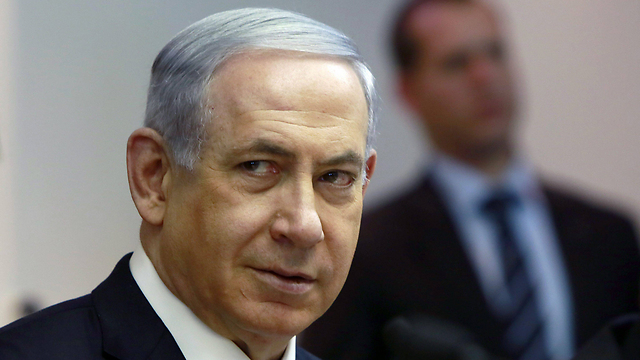
Voters must choose: Netanyahu or path of peace
Op-ed: PM's failures have caused significant damage to Israel on security, Iran, peace talks and economy.
This election is of critical importance to Israel's security. Since the establishment of the state, our very existence has twice been at risk.
The first time was during the War of Independence; the second time was during the Yom Kippur War. In 1973, Israel paid a heavy price – 2,569 dead and 7,251 injured. As the commander of an armored division on the Suez Canal front from the first moments of that war, assomeone whose troops fended off the Egyptian onslaught for the first 24 hours until the arrival of reinforcements, and as someone who lost 320 soldiers in taking the Canal, I know the true meaning of war.
I also know how dangerous the illusion of temporary quiet is, and how tempting it is to think that it will last forever. As long as Israel refrains from initiating a serious move for regional peace, the current quiet will not last and harsh wars will follow.
Israel today faces a different kind of existential challenge. The election will determine whether Israel will put itself on the path of peace and achieve recognized and permanent borders, or whether we will continue to stumble along the current path – the path of conflict and war, of regional and international isolation, and the inability to separate ourselves from the Palestinians; a path that leads to national disaster.
A government that perpetuates the settlement enterprise in the West Bank will turn Israel into a pariah state – economically and politically. A country that controls another nation – 2.7 million Palestinians in the West Bank and indirect control over 1.8 million more in the Gaza Strip – will lose what remains of its moral character and values. Already today, there are clear signs that the Israel Defense Forces' fortitude is being eroded because of the day-to-day friction with Palestinians in the West Bank.
Continuing to build settlements beyond the separation barrier will lead to an irreversible slide towards a bi-national statein which Israel will lose its Jewish character.
The failures of our prime minister during his prolonged term in office have caused significant damage to Israel's security. Netanyahu has failed when it comes to the principal security-related tasks he set for himself – halting Iran's efforts to become a nuclear-armed state, and toppling the Hamas regime in the Gaza Strip.
And if that is not enough, he has undermined the international entities that are working to thwart Iran's nuclear aspirations, just as he has eroded their support of his anti-Hamas stand. His behavior over the past two years is endangering the very fabric of our strategic relationship with the United States; and, in the past few days alone, he has accused the Europeans of plotting to overthrow him – a clearly baseless charge.
An equally serious failing on the security front is his inability to see and seize the security and political opportunities created by years of regional upheavals, which have weakened most of Israel's main rival and created a common interests not just between those countries with which we have already signed peace accords – Jordan and Egypt – but also governments from North Africa to the Persian Gulf. A rare window of opportunity was opened up for a new dynamic in the region – a dynamic of dialog, calm, political agreements and security pacts.
For the past 20 years, Israel and the Palestinians have been engaged in fruitless negotiations. We need to adopt an alternative – the regional initiative. In 2002, the Arab League launched the Arab peace initiative. It was adopted by other Muslim countries, taking the total number of signatories to around 50. The initiative put an end to decades of Arab rejectionism; it included a commitment to normalize ties with Israel as part of a comprehensive peace deal; it determined that the question of Palestinian refugees would not be settled without Israel's agreement – and more.
There were also elements to the original Arab peace initiative that required amendment. And, indeed, Arab countries became more flexible. The original demand for a return to the 1967 borders was revised to territorial exchanges. There is international agreement that Israel will annex three major settlement blocs.
In public and in private messages, senior Arab officials made it clear that the Arab peace initiative was not the final draft of any agreement and that they would be willing to listen to Israeli reservations, including the fact that the Golan Heights is not currently part of any proposal.
Israel also demanded that normalization of ties with moderate Arab states should happen at the same time as progress is being made on the Palestinian track. It is clear to everyone that Jordan will be Israel's security border. It is clear to us that the IDF and the security forces can safeguard Israel's security no matter where the border is drawn.
A political settlement equals national security!
Israel and the pragmatic and moderate Arab states have common enemies – Iran and the radical Islamic terror groups. These enemies pose more of a threat to the Arab countries than they do to Israel. We have, therefore, a golden opportunity, in which regional interests are identical. By including the Palestinian issue in a regional initiative, we can achieve comprehensive political-security agreements.
There's a basis for a joint Israeli-Palestinian-Jordanian security alliance, which would provide a solution for the West Bank – just as there's a basis for a similar agreement between Israel, the Palestinians and Egypt to safeguard the border with Gaza. Everyone can see this. And no less important is to reach a regional security agreement, which would include all of the moderate Arab countries and Israel. As part of this agreement, we would share intelligence and could even conduct joint military operations against our common enemies.
But it is impossible to address this issue without mentioning the economic aspects. Any progress on the political front with our neighbors and with the Palestinians will open up new markets for Israel, markets with 1.5 billion potential customers. These countries would become key markets for Israeli technology and other products, and also for economic projects that would change the face of the Middle East.
Economic research conducted recently by Israelis shows that within 10 years of signing a regional peace accord, Israel's annual budget would grow by an average of NIS 37 billion. From the tenth year onward, the budget would increase by NIS 67 billion a year. The per capita GDP would grow to $50,000 – and this would change Israeli society beyond recognition.
The surprise that we suffered in the Yom Kippur War stemmed from our leaders' blindness. They were arrogant and they ignored clear trends that were being played out in front of their very eyes. Israel is under threat now from the same blindness. The future of the country as a democratic and Jewish state is on the line. Continuing to walk the path of the current leadership will lead to an end to the Zionist vision and the creation of a bi-national state between the Mediterranean Seaand the Jordan River.
As someone who has survived the horrors of war, as someone who has lost his best friends on the battlefield, I am fearful of a leadership that does not initiate a political-security solution, a leadership that will crush Israel's Jewish and democratic identity and march our children from one conflict into the next.
Election Day provides every citizen with the opportunity, and duty, to vote for a worthy leadership.
Major General (ret.) Amnon Reshef was a renowned brigade commander in the Yom Kippur War and later served as commander of the IDF Armored Corps.











